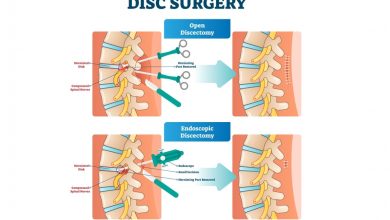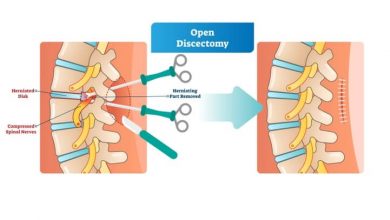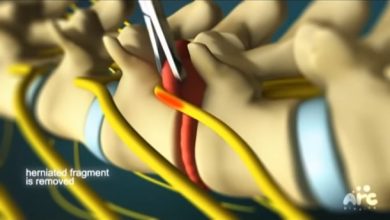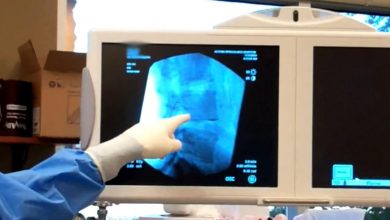Discectomy Surgery

A discectomy is a surgical procedure that is conducted to do away with a disc that has herniated or extruded. When disc herniation occurs, a piece of the normal spinal disc gets displaced. This piece tends to exert a pressure over the spinal cord and / or the nerves encircling the spinal cord.
More often than not, the surgeon recommends a discectomy if:
- You have severe leg pain or tingling numbness that refuses to go away, thereby, making it hard to do everyday tasks.
- There is extreme weakness in the muscles of the buttocks and legs
- Pain radiates to the buttocks, thighs and / or legs
- If you have problems with the bladder or the bowel, or the pain is excruciating and drugs fail to bring relief, you will in all probability need a surgery right away.
This surgical procedure removes the piece of spinal disc that impinges and exerts pressure over the nerve. The conventional procedure is called an open discectomy. In an open discectomy, the surgeon will make a small incision and excise the disc, thus relieving the weight on the nerve.
Discectomy Surgery: The Procedure
- Discectomy is carried out under general anesthesia. The surgery takes approximately 1 hour; however, this depends upon the degree of herniation, among other factors.
- The patient is made to lay face down, with the back looking upwards.
- The surgeon makes an incision of about 3 cm in the middle of the back. The will then very carefully dissect the muscles away from the bone of the spine. He will remove a small portion of the bone and ligament from the back of the spine. This component of the discectomy surgery is called a laminotomy.
- After the bone and ligament are excised, the surgeon will be able to see, and take care of, the nerves. Thereafter, the disc piece that has herniated is eliminated. Depending on the manifestation and the condition of the remaining disc, more portions of the disc may be excised out in order to avoid another section of disc from herniating later on. The surgical cut is then closed and a bandage is applied.
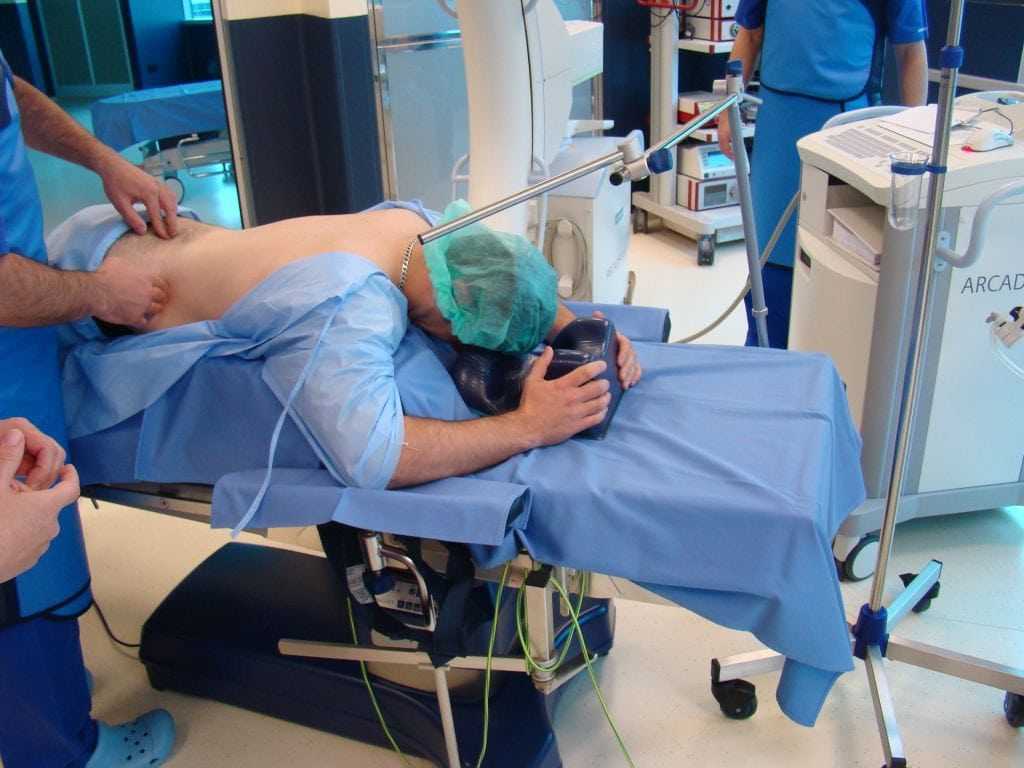
What is the Recovery after a Discectomy Surgery?
The symptoms (pain, tingling, numbness, etc) will take a few weeks to resolve. It is quite common to experience pain around the incision site, but this is easily managed with pain killers. You will need to stay one day at the hospital, and will be discharged the next day. Your doctor may recommend a lumbar corset brace, since it helps relieve the pain to some extent.
You surgeon will advocate gentle, non strenuous activities after the procedure; he will encourage walking and sitting upright. You must steer clear of lifting heavy weights at all costs, and do not twist or bend the back a lot. Avoid all kinds of strenuous activity until your surgeon permits you to.
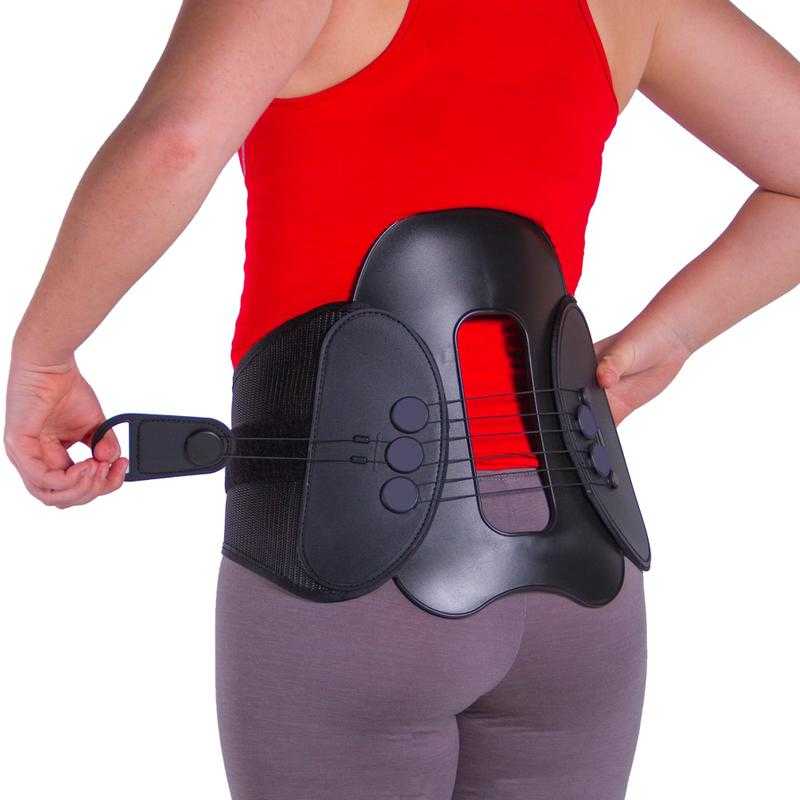
Discectomy Surgery Risks
As is the case with any kind of surgery, several complications and risks are associated with discectomy surgery as well, these include:
- Bleeding is one of the commonest complications; but is can be easily handled.
- Bladder or bowel incontinence
- Infection may require further surgery and longer hospitalization.
- Dural tear and cerebrospinal fluid leak is known to occur in about 2% cases. Nevertheless, it does not alter the outcome of the surgery, however, after the operation, you may be asked to lay recumbent for 2 days to let the leak close up.
- Nerve root damage can occur in some patients as well; this results in pain and weakness that does not go away.
- Another frequent risk that is associated with discectomy is that another portion of disc may herniate and trigger similar symptoms later on. Recurrent disc herniation is relatively common and is seen in around 10% – 15% cases.
- Nearly all patients experience relief of much, if not all, of the symptoms after the operation. On the other hand, the success of the surgery is about 85% – 90%, meaning that about 10% of the patients who undertake the surgery may still have continual symptoms. Those who continue to have symptoms for prolonged intervals of time, or have grave neurologic deficits are at a greater risk of partial recovery. Approximately five to ten percent patients develop recurrent disc herniation. A recurring disc herniation could arise immediately after the operation or after several years; however they are common during the first 3 months after the discectomy. In case this happens, a correction microdiscectomy needs to e carried out. Conversely, after a repetition, one is at greater risk of further recurrences.
- A grave risk factor is that the back pain may not get better at all, or may come back later.
Nonetheless, the above risks and complications are rather rare and can be effectively handled.
Discectomy Surgery Cost
The cost of discectomy surgery varies from $15,000 (additional anesthesia fees and hospital fees) to $75,000 (in case, a spinal fusion procedure becomes essential in order to stabilize the spine). Anesthesia fees and hospital fess tend to be about $15,000.
You should also be prepared for certain supplementary expenses. Extra discectomy costs may occur if the surgeon feels you need a back brace; this will cost you upwards of $75, medication that may be a couple of hundreds of dollars, follow-up appointments and physical therapy will cost you around $1000.
A discectomy surgery isn’t usually the first preference for managing your back pain, however, when you have tried everything and are left with no alternatives, the expenses will be worth it in the long run. Find a highly skilled, proficient and reputable surgeon to carry out the surgery to be sure that it will be conducted properly. The surgery is conducted by an orthopedic surgeon. The branch of orthopedics has evolved a host of assorted sub-specialties, including back, hand, and foot surgeries. Talk to your surgeon and discuss your options, recovery and risk with him.
For More Information Also You Can Check This – All About Discectomy Procedure
The Best Hospitals for Discectomy Surgery
- University of Michigan Health System–Department of Orthopedic Surgery
- Hospital for special surgery (HSS), New York
- Oakwood’s Center for Orthopedic and Neurosciences
- DMC Surgery Hospital

